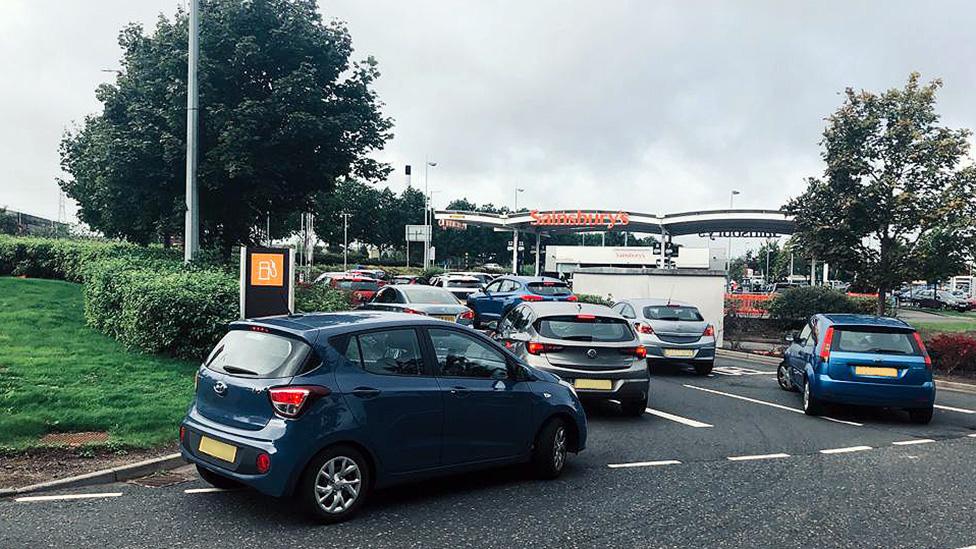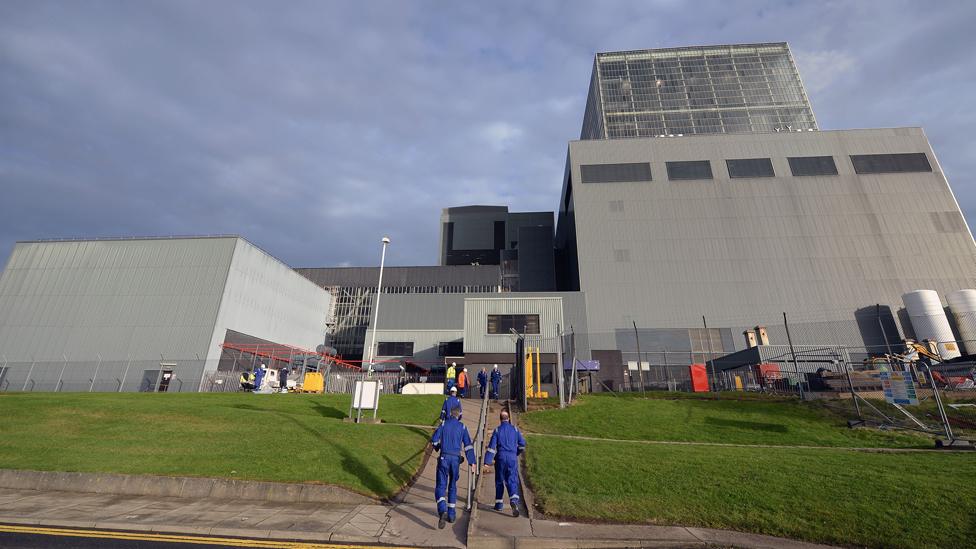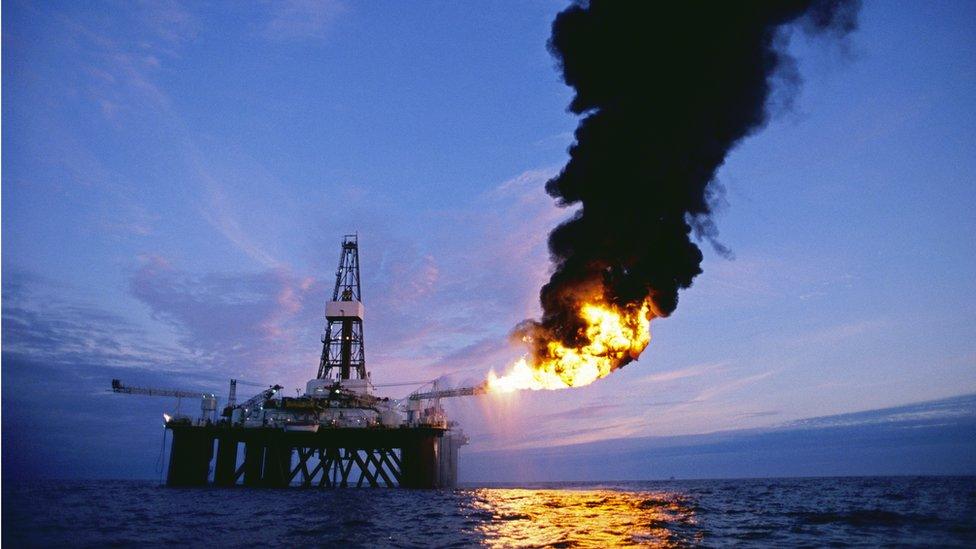If you think this is a fuel crisis…
- Published

Drivers queue for fuel at a forecourt at Braehead in Renfrewshire
Globally gas, oil and coal prices have been soaring, as economies re-open and supplies stall.
With wind turbines becalmed, several looming crises from Chinese power cuts to US forecourts could overshadow Glasgow's climate summit and the push to cut fossil fuel emissions.
While Britain has focussed on motor fuel shortages, the crisis for gas suppliers has been getting more severe. Business customers face fast-rising contract prices. Household customers have protection for now, but costs are mounting up for next year, even if prices drop. That will add to inflationary and political pressures.
Energy prices have been soaring. The price of natural gas has risen more than five-fold since March. In less than two days trading this week, it rose more than 20%.
The international benchmark price of oil, Brent crude from the North Sea, passed $80 per barrel on Tuesday, more than twice the level last autumn.
For those looking to the Glasgow climate summit in November to mark the end of old king coal, the price of benchmark Australian coal is also up to record levels.
Oil and gas prices fell back later on Tuesday, as news came from China indicating a marked slowdown in economic growth.
Stock markets in Europe and tech stocks in the US took a tumble, anticipating a knock-on effect on growth and profits globally. Sterling also fell, adding to the upward pressure on forecourt prices for a commodity traded in US dollars.
China's problems have a lot to do with severe power cuts shutting down electricity supplies across vast cities and numerous factories in the country's industrial heartland. The response, in some provinces at least, is a demand for more coal imports.

Glasgow's Scottish Events Campus where up to 20,000 delegates are expected to meet for COP26
Australia, which lost its valuable Chinese coal export market due to deep diplomatic differences, will watch closely to see if Beijing opens it up again.
None of that bodes well for the Glasgow summit, as world leaders arrive with political pressure on their home fronts to focus instead on getting through a winter that has the potential for energy crises on several fronts.
President Biden is more concerned, for now, about the doubling in the US price of motor fuel this year. It rises at a faster rate in the USA than the UK and Europe because there's less fixed rate tax on it.
Meanwhile, Europe is more focussed on gas prices as the heating is switched back on.
So scanning the horizon of economic threats, this week's focus in Britain on the consequences of too few tanker drivers to keep supplies flowing to retailers may look like an energy crisis, but could soon come to look like a minor one.
Becalmed
In the UK and Europe, we have seen this summer what happens when the wind drops to sustained low wind speeds. Baseload is required to keep the lights and the air conditioners on.
Much of that has come from burning natural gas. Britain is among those to be firing up its old coal power stations to help plug the gap - a last gasp before they face their final closure in 2024.

Hunterston in Ayrshire is due to close in a little over three months
In little more than three months, Hunterston nuclear power station in Ayrshire will stop feeding the national grid. Britain's nuclear "fleet" is being decommissioned with one big station a long way from being ready to replace it.
There is indecision on whether others will join Hinkley Point. Neither the SNP nor their Green allies would allow any in Scotland.
Gloopy oil
One consequence of the dash for gas and its spiralling price is that oil is seen as a substitute - not so much in Europe as in east Asia. Oil-burning power stations there are being prepared to use more of their considerable spare capacity to plug the power gap.
One signal of the rising demand for oil this week was from Indian imports last month. Its economy is opening up again after a bad bout of Covid's Delta variant.
Goldman Sachs industry analysts reckon the price of oil could continue rising to around $90 per barrel by the end of the year.

An offshore oil exploration rig, in the Scottish sector of the North Sea, burns off oil and natural gas
Meanwhile with environmental and political pressure to choke off investment in developing further oil reserves - including the decision on the Cambo field west of Shetland - the replacement of old fields looks increasingly gloopy and viscous, unreliable and expensive.
Caught unawares by the surge in demand, oil exporters have been slow to respond due to bottlenecks and production shut-downs.
Gas goes global
So what about the extraordinary rise in gas prices? And what do they mean for bills?
The shift of attention to queuing at petrol stations does not mean the gas suppliers' problems have gone away. Far from it. The surging price for wholesale gas sold on the spot market - as an increased share of it is, since Europe reformed its market to turn away from over-dependence on Russia - puts even more suppliers in peril.
That Russian dependence becomes more of an issue with the proposed opening of the Nord Stream 2 pipeline into Germany. Some market-watchers think Gazprom and the Kremlin have declined to boost gas supplies in response to increased demand until the pipeline deal is approved in German courts. The likely role of Greens in Berlin's next government means a prolonging of that delay.
Britain was one of those choosing to diversify supply to Norway, which boosts its exports this week, and LNG, liquified natural gas, carried on tankers from the Persian Gulf, North Africa and the Gulf of Mexico.
One, from the USA, is due to arrive in the Thames on Wednesday. But supply shortages mean others are going to Asia. Where gas used to be a regional market, linked by pipelines, LNG has made it global.
Disruptive and nimble
British industry insiders expect to see 10 more companies cease trading. So far, nearly 1.5m British households have had to be transferred by the regulator Ofgem from collapsed suppliers to solvent ones. A rough estimate is that a further 3.5m households will have to do so before too long.
The big retail players have hedged for one to two years ahead. When they take on a household for a one or two-year fixed price contract, they have already backed that with their own fixed price contract with a wholesaler.

Their expectation is that the smaller players have failed to hedge against price increases, and they're unable to stay in business while they have to buy on the spot market.
These are firms that believed the claims, common in the first half of last decade, that the former Big Six in supply were profiteering, and that innovative, disruptive, nimble, smaller players could enter the market and grab market share with lower prices.
They had the support of the government and Ofgem, which was instructed to push hard to boost switching, giving these newcomers a fair wind.
At one point in 2018, Britain had 62 companies competing, and many more brands within that. Until this month, the Scottish government planned to add its own. But without adequate hedging, scale, data, market experience or access to capital in a crisis, they have been falling away, to 47 by last April.
This time of year is when they face Ofgem's bills for the add-ons on household bills, including renewables obligations and social levies. Some have probably been burning through the stockpile of customer credit that they have at the end of a summer of low wholesale expenditure.
A growing number of them are classed as being in credit default. So not only are they struggling to pay their dues to Ofgem: when they stop trading, the pledge that customer credit is protected falls on the company that takes over that customer base.
In normal times, that is an appealing windfall for suppliers - gaining hundreds of thousands of new customers, which they would normally spend a lot to recruit.
In normal times they have to add in the price cap on the variable tariff, intended to stop excess profits from those who fail to sign up to new contracts.
It goes up this week by an average £137 to £1,277 for dual fuel. For a customer, that is cheaper than any new fixed price deal. Suppliers who depend on spot price gas will still be losing money.
On business customers, there is less protection. Energy analysts at Cornwall Insights reckon new contracts for a mid-scale SME (small and medium-sized enterprise) are up 59% on this time last year for gas, and by 33% for electricity. Even since last quarter, they are up 28% and 12% respectively. That has got to hurt, and we are likely to see some of it passed on in prices.
Inflation pressures
So the gain of those extra residential customers by Ofgem transfer comes at a very high price, estimated by one big supplier at around £1bn per million customers.
Their reward comes next year, when the extra cost washes through the system with a much bigger increase in prices. The price cap is expected to get close to an average £1,600.
So that will not be because gas prices will stay high. On the contrary, the Platts energy consultancy expects them to fall sharply after winter. It is because the variable tariff cap is based on prices some months before, and an industry levy kicks in, with which to pay the price of the departed companies' low pricing.
In addition, if the net zero targets are biting after a Glasgow agreement, there should be further pricing incentives to shift electricity to renewable sources, and gas heating to electric.

Household energy bills are expected to soar
That could be a tricky one for the government to explain: gas prices falling or at least easing next year, while household bills soar.
And that's along with the other inflationary pressures now built into Britain's near-term economic future. Next year will see higher National Insurance bills for employers and workers.
And now the prime minister wants lorry drivers to be paid more, to encourage more people to plug the labour market gaps left by departed European workers. What appears to be a Brexit bonus for some workers means a rise in business costs, and that is likely to push up prices.
Even more so when the same argument applies to warehouse workers, farm labour, social carers, hospitality, bus drivers, the health service, construction...
- Published24 September 2021

- Published24 September 2021
